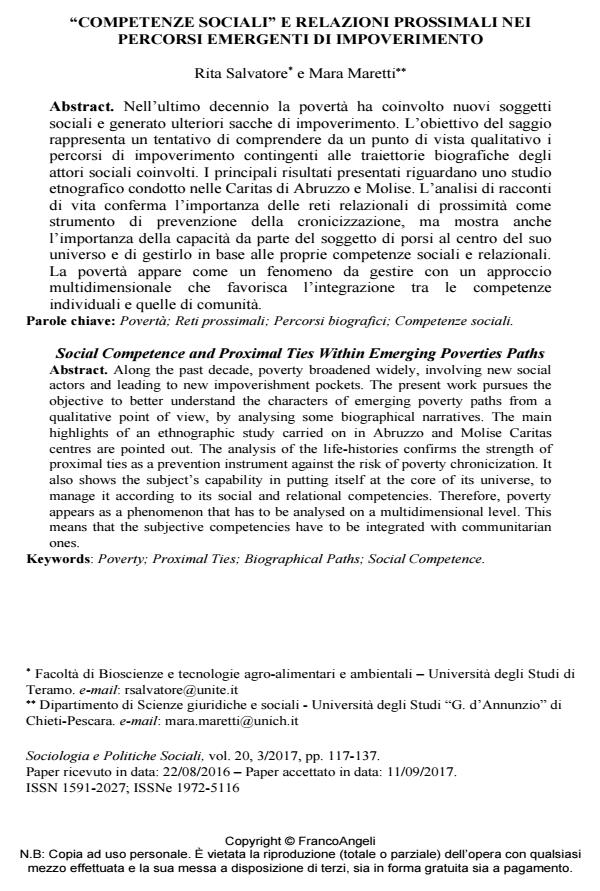Social CompeteSocial Competence and Proximal Ties Within Emerging Poverties Paths nce and Proximal Ties Within Emerging Poverties Paths
Journal title SOCIOLOGIA E POLITICHE SOCIALI
Author/s Rita Salvatore, Mara Maretti
Publishing Year 2018 Issue 2017/3 Language Italian
Pages 21 P. 117-137 File size 260 KB
DOI 10.3280/SP2017-003007
DOI is like a bar code for intellectual property: to have more infomation
click here
Below, you can see the article first page
If you want to buy this article in PDF format, you can do it, following the instructions to buy download credits

FrancoAngeli is member of Publishers International Linking Association, Inc (PILA), a not-for-profit association which run the CrossRef service enabling links to and from online scholarly content.
Along the past decade, poverty broadened widely, involving new social actors and leading to new impoverishment pockets. The present work pursues the objective to better understand the characters of emerging poverty paths from a qualitative point of view, by analysing some biographical narratives. The main highlights of an ethnographic study carried on in Abruzzo and Molise Caritas centres are pointed out. The analysis of the life-histories confirms the strength of proximal ties as a prevention instrument against the risk of poverty chronicization. It also shows the subject’s capability in putting itself at the core of its universe, to manage it according to its social and relational competencies. Therefore, poverty appears as a phenomenon that has to be analysed on a multidimensional level. This means that the subjective competencies have to be integrated with communitarian ones.
Keywords: Poverty; Proximal Ties; Biographical Paths; Social Competence.
- Allegri, E. 2015. Il servizio sociale di comunità. Roma: Carocci.
- Berger, P.L. e Luckmann, T. 1966 The Social Construction of Reality. New York: Doubleday and Co.; tr.it.: 1969.
- Bertaux, D. 1998. Les Récites de vie. Paris: Editions Nathan; tr. it.: 1999.
- Bichi, R. 2002. L’intervista biografica. Una proposta metodologica. Milano: Vita & Pensiero.
- Bichi, R. 2007. L’intervista e la persona: quale statuto di parola? In Gruppo SPE a cura di 2007. La sociologia per la persona. Approfondimenti tematici e prospettive, pp. 130-143. Milano: FrancoAngeli.
- Caldarini, C. 2008. La comunità competente. Roma: Ediesse.
- Creswell, J.W. 2003. Research Design. Qualitative, Quantitative and Mixed Methods Approaches. 2nd ed. Thousand Oaks: Sage.
- Denzin, N.K. 1989. Interpretive Biography. London: Sage.
- Esping-Andersen, G. e Venzo, C. 1995. Il welfare state senza il lavoro. L’ascesa del familismo nelle politiche sociali dell'Europa continentale. Stato e mercato, pp. 347-380.
- European Commission. 2014. Employment and Social Developments in Europe 2013. Luxembourg: Office of the Official Publications of the European Communities.
- Ferrera, M. 1996. The “Southern Model” of Welfare in Social Europe, Journal of European social policy, 6(1), pp. 17-37.
- Ferrera, M. 2012. Le politiche sociali. Bologna: il Mulino.
- Hick, R. 2012. The Capability Approach: Insights for a New Poverty Focus. Journal of social policy, 41(02), pp. 291-308.
- Jedlowski, P. 2005. Un giorno dopo l’altro. La vita quotidiana tra esperienza e routine. Bologna: il Mulino.
- Mantle, G. e Backwith, D. 2010. Poverty and Social Work. British Journal of Social Work, (40), pp. 2380–2397
- Minardi, E. e Bortoletto N. (a cura di) 2015. Ricercazione, innovazione sociale, sviluppo locale. Milano: FrancoAngeli.
- Minardi, E. e Bortoletto, N. 2014. Vecchie e nuove povertà nell’attuale prospettiva dei servizi sociali: la realtà dei servizi Caritas dell’Abruzzo e del Molise. Rassegna di Servizio Sociale - Rivista Trimestrale EISS, pp. 26-50.
- Minardi, E. e Cifiello, S. (a cura di) 2005. Ricercazione. Teoria e metodo del lavoro sociologico. Milano: FrancoAngeli.
- Naldini, M. 2002. Le politiche sociali e la famiglia nei Paesi mediterranei. Prospettive di analisi comparata. Stato e mercato, 22(1), pp. 73-100 DOI: 10.1425/117
- Naldini, M. 2003. The Family in the Mediterranean Welfare States. London: Frank Cass.
- Naldini, M. e Saraceno, C. 2007. Sociologia della famiglia. Bologna: il Mulino.
- Negri, N. e Saraceno, C. 2003. Povertà e vulnerabilità sociale in aree sviluppate. Roma: Carocci.
- Nussbaum, M. 2000. Women’s Capabilities and Social Justice. Journal of Human Development, 1(2), pp. 219-247 DOI: 10.1080/1464988002000874
- Nussbaum, M. 2003. Capabilities as Fundamental Entitlements: Sen and Social Justice. Feminist Economics, 9(2-3), pp. 33-59. DOI: 10.1080/135457002200007792
- Paugam, S. 2005. Les forms élémentaires de la pauvreté, Parigi: Presses Universitaires de France; tr. it.: 2013.
- Pierson, J. 2008. Going Local: Working in Communities and Neighborhoods. London: Routledge
- Robeyns, I. 2005. The Capability Approach: A Theoretical Survey. Journal of human development, 6(1), pp. 93-117 DOI: 10.1080/14649880520003426
- Rovati, G. a cura di 2006. Le dimensioni della povertà. Strumenti di misura e politiche. Roma: Carocci.
- Sen, A. 1999. Development as Freedom. Oxford: University Press.
- Sen, A. 2009. The Idea of Justice. London: Allen Lane.
- Warburton Brown, C. 2011. Exploring BME Maternal Poverty: The Financial Lives of Ethnic Minority Mothers in Tyne and Wear. Oxford: Oxfam GB.
- WBG (Women’s Budget Group) 2006. Women’s and Children’s Poverty: Making the links. London: WBG.
- La certificazione delle competenze come strumento di welfare attivo e inclusivo Mara Maretti, Roberta Di Risio, in SOCIOLOGIA DEL LAVORO 156/2020 pp.214
DOI: 10.3280/SL2020-156010
Rita Salvatore, Mara Maretti, "Competenze sociali" e relazioni prossimali nei percorsi emergenti di impoverimento in "SOCIOLOGIA E POLITICHE SOCIALI" 3/2017, pp 117-137, DOI: 10.3280/SP2017-003007